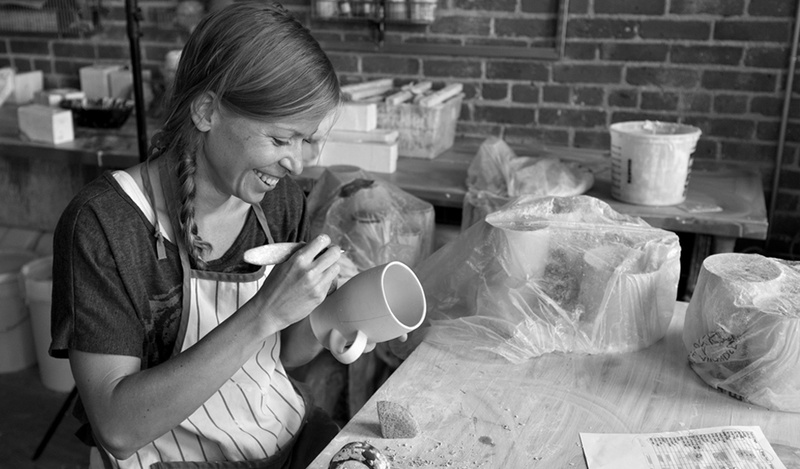Nicole Aquillano, a ceramic artist and former engineer from Fort Point, Mass., creates pieces of pottery inspired by the architecture around her. Using photographs of her favorite buildings, she copies the designs onto her work and fills them in with blue and clear glaze, creating a dripping effect that she feels gives the works a sense of nostalgia. After giving a talk at the Harvard Ceramics Studio on Thursday, Aquillano spoke about her work, her upcoming projects, and her recent transition from environmental engineer to full-time entrepreneurial ceramicist.
The Harvard Crimson: What first got you interested in ceramics?
Nicole Aquillano: In college, I was going to school for my degree in mathematics and civil engineering, and I had to take a liberal arts credit. So I took a clay class, and of course, I loved it and I spent all my free time in the studio. Then after that class my professor approached me and asked me if I was thinking about maybe taking the second-level clay class and encouraged me to do that, so I ended up taking a clay class every semester and getting a minor in art because I kind of knew that was what I really wanted to do.
THC: What gave you the idea to combine architecture with ceramics?
NA: I had always used architecture as my inspiration for my work, but going into grad school I was translating that into abstract patterns with lines and dots [and] a lot of repetitiveness, because you see that a lot in architecture. And then halfway through grad school I had a critique where someone told me to be more specific in what I was referencing, to try that out, and so I did.
THC: How do you achieve the dripping effect you utilize on many of your ceramics?
NA: It was kind of an experiment. I had some work [and] I didn’t really like how they’d turned out, so I threw them in a high fire glaze kiln. It was a mid-range glaze, [and] putting a mid range glaze in a high-fire kiln makes it run. But I really like how the clear [glaze] that I used pulled the color out from the drawing a little bit, and...kind of makes it look more like a memory or gives it a feeling of heaviness, or just seriousness.
THC: How do you decide what buildings or structures to draw?
NA: I like to use imagery that is important to me—that way it makes sense to me that I’m drawing it. Although I do a lot of custom work [too], which is really fun [because I] get to hear someone else’s story. But I tend to gravitate toward imagery from my surroundings. I live in Fort Point, so I use a lot of Fort Point imagery and places that have had a big impact on me. I use a lot of North End scenes…because really the North End was the whole reason I moved to Boston. I just fell in love with it—it was exactly like Italy. Like, how could I not move? I also draw my childhood home over and over again.
THC: Can you tell us anything about any future projects that youhave planned?
NA: I am doing a workshop in Brockway, Pa.…at the Brockway Center for Arts, and a show there too, in conjunction with the workshop…. [We also have] a really fun event in Fort Point on the 18th, 19th, and 20th of October. All the artists in Fort Point…open their doors to their studios and let the public come in and see what they’re working on and what they’ve made in the past couple months.
Read more in Arts
Part Two of "20/20" Is A Bleary Follow-Up













